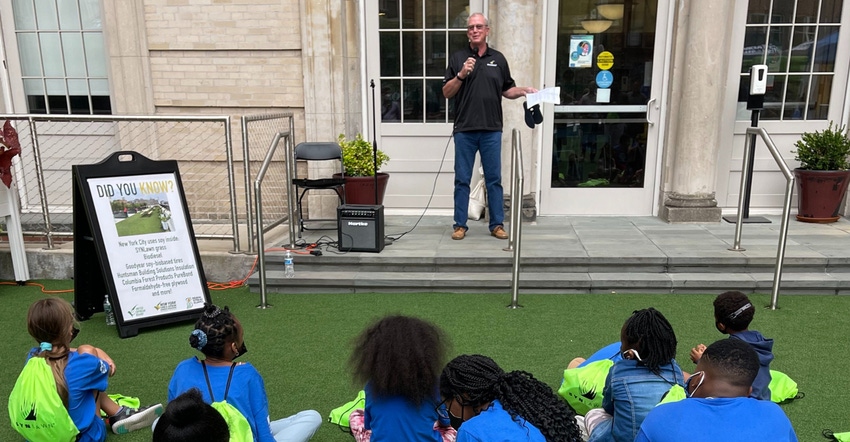
New York state farmers are expected to produce 17.5 million bushels of soybeans this year. That’s a small number compared to a place such as Ohio, where farmers are expected to produce 283 million bushels of soybeans.
But there are some innovative uses for the “wonder bean” in the state as demonstrated by a recent visit to New York City by members of the New York Corn and Soybean Growers Association, the United Soybean Board and the Indiana Soybean Alliance.
At the Farmers on the Green event held at the Boys and Girls Club of Harlem, soy-biobased grass distributor SynLawn of New York donated a soybean-based synthetic grass to the organization.
“SynLawn New York was so proud to partner with USB, the Boys and Girls Club of Harlem and the John Bowne FFA chapter,” local SynLawn owner Anastasia Phillips said in a news release. “We are a long-standing participant in the USDA BioPreferred program, and are excited that this event created an opportunity to educate children and adults as USDA Deputy Undersecretary for Rural Development Justin Maxson released USDA’s new report with us at the Boys and Girls Club.”
That report, “An Economic Impact Analysis of the U.S. Biobased Products Industry,” includes several recommendations developed in collaboration with the soy checkoff on how to grow the industry.
Ralph Lott, a Seneca Falls, N.Y., farmer and vice chairman of the United Soybean Board, wore a pair of sandals made of a soy-based product to the event.
“These are kids that would have never had the opportunity to meet a farmer or know what farming is like,” he says.
Lott farms 3,500 acres of crops, including 1,700 acres of soybeans.
As a member of the USB board, which has 78 directors, Lott gets to vote on dozens of research projects a year to grow the industry. It’s one of the key reasons why farmers pay into the soybean checkoff.
This year, the board financed $78 million worth of research projects, but it’s not often that members of the board get to see end products from the research.
In that sense, Lott says going to the event was a treat because not only was he able to talk soybeans with children, but he was also able to see products made — even if only partially from soybeans — in person.
"It's a very unique treat, and I hope that further down the road that we get more and more companies that are taking soybean oil, or soybean meal, that are doing something with it to help soybean farmers," he says.
All about the oil
While in New York, soybean checkoff leaders met with biodiesel and biobased product users, including the fleet leadership team for New York City, which uses biodiesel in the city’s fleet and has switched to hundreds of Goodyear’s soy-based tires in its cars and trucks.
The New York Fire and Parks Departments collaborated with USB and the Indiana Soybean Alliance on the state’s first demonstration of PoreShield, a soy-based concrete durability enhancer that lengthens the life span of roads and bridges by protecting the pores in concrete from damage caused by salt, ice and water.
Lott hopes to see how durable the concrete is in the future and possibly get more widespread adoption of the product from other companies.
“It’s one of these things where if we can follow through with them, we’ll hopefully go down there for numerous views in the future, and then we can watch and see what it does to that concrete,” he says, adding that more than 1,000 products can be made of soybeans. “Almost anything that we make out of petroleum products, we can put soybean oil in its place, and soybean oil is something we can grow.”
Artificial turf is one of those products. Phillips says that polyol soy oil can displace up to 70% of the petroleum used to make the backing of the company’s artificial turf products.
The products, which have a USDA-certified biobased product label, drain better, are more durable and last several years longer than conventional petroleum-based turfs, she says.
SynLawn sources most of its soybean oil from the Midwest, she says, but participating in the Farmers on the Green gave her the chance to interact with New York farmers who also likely provided some of that soybean oil.
Small player, big hopes
Lott used to send his soybeans to New Jersey to be exported, but these days he sends all his soybeans to local elevator DuMond Grain, which has upgraded its facilities to accommodate growth in the industry, including a new soybean oil press.
Lott’s been on the USB board for nine years. And if everything goes as planned, he will be chairman of the board starting next year.
As the state’s dairy industry goes, so does the state’s soybean acreage — and for that matter corn, he says, as most of it goes for animal feed. Right now, dairy is stable, so Lott doesn’t predict a big increase in soybean or corn acreage anytime soon. But if dairy consolidation continues and more farms go out of business, Lott thinks that might open the door to more grain acres coming online.
On his own farm, things are going well this year, and he expects a good crop this season.
“We’re pretty consistent. Everything is no-tilled,” Lott says. “We haven’t tilled the ground since 1986, and we’re just happy with what we’re doing, and we like that corn-soybean rotation.”
About the Author(s)
You May Also Like






